By Carolyn Said
San Francisco Chronicle.
Airbnb CEO Brian Chesky told an audience of city planners, lawmakers, government staffers and policy wonks on Thursday that his vacation-rental site is a positive force for helping middle-class people make ends meet, reiterating the company’s party line.
“We are here to empower people living in cities,” Chesky said at the Code for America conference in Oakland, responding to softball questions from O’Reilly Media founder Tim O’Reilly in a 15-minute discussion.
Many in the audience were the kind of folks who have concerns about Airbnb’s impact on housing and neighborhoods, but they didn’t get to ask questions.
One of the world’s most valuable private companies, Airbnb is worth more $25 billion. But Chesky insisted that material success is immaterial to him, noting that Airbnb started as a way for him and his roommate to pay their rent, letting visitors crash on blow-up beds in their South of Market bachelor pad.
“I created a company not to be a successful entrepreneur and make a bunch of money,” he said. “If I wanted to do that, I wouldn’t have started with airbeds for conferences.”
He used that origin tale to springboard into a quick attack on San Francisco’s pending Proposition F, a November ballot initiative that would severely restrict vacation rentals in private homes.
“Prop. F proponents say we are anti-affordable housing,” Chesky said. “It’s pretty weird because our founding story was to allow people to stay in their homes.”
Not mentioned: Airbnb has ponied up $8 million to fight Prop. F, which would impose steep fines on platforms like Airbnb if they carry illegitimate listings, such as ones from people who don’t actually live in the homes they rent out.
Chesky did acknowledge that that’s an issue — in New York.
“Not everything on Airbnb is perfect,” he said. At its start, he believed in Craigslist founder’s Craig Newmark’s contention that communities should be open, democratic and self-regulating like immune systems.
“I don’t believe that anymore,” Chesky said, adding that Airbnb now will act to weed out bad players.
Some people in New York were buying up apartments to rent through the platform, so 18 months ago, Airbnb kicked off a couple thousand of listings there, he said. Also not mentioned: That move came after both state and city regulators claimed the site was showcasing illegal hotels, and the New York attorney general had subpoenaed its host records.
“We succeeded not because of (the professional hosts) but in spite of them,” he said. “The vast majority of our hosts are regular people. The whole point is belonging, staying in a real person’s home.”
Chesky rattled off places where the company is now remitting hotel taxes — San Francisco, Portland, Nashville, Amsterdam, Paris and the whole state of Washington — and said it’s in discussions with 40 or 50 more cities about paying the taxes, which often are a city’s second-biggest revenue source after property taxes.
“It turns out you cannot send a city a briefcase of money — not that we’ve tried,” he joked. “You have to integrate your systems.”
Airbnb wanted to pay the hotel tax “to be legitimized and recognized as a player,” he said. Moreover, the tax — which tacks on an extra charge to guests’ bills — hasn’t lowered its bookings.
Airbnb now remits more than $1 million a month for San Francisco’s 14 percent hotel tax, and this week won the Treasurer & Tax Office’s recognition as a “qualified Web company,” meaning that its hosts are liberated from some of the tax red tape.
Liberation from red tape in fact is a theme for Code for America, a 6-year-old nonprofit that seeks to integrate technology to make government simpler, more effective and easier to use.
The 1,300 people attending the three-day summit heard presentations like “How Google helped San Francisco use data science to understand a surge in 911 calls.”
Code for America embeds both volunteers and mid-career professionals in local governments.
“We wanted to fix some of these challenges we’re seeing,” said Nicole Neditch, senior director of practices. “We’ve learned a lot by putting people directly into local government and have them work on the biggest challenges.”














































































































































































































































































































































































